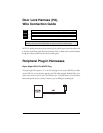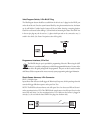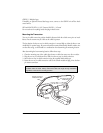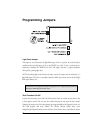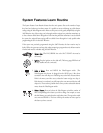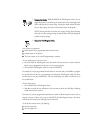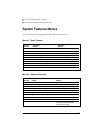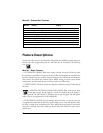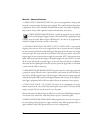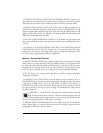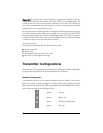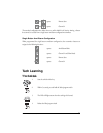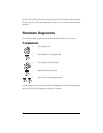
©
2003
Directed Electronics, Inc.
27
NOTE: Remember, when passive arming is selected, the unit will chirp 20 seconds after the last
door is closed. The system does not actually arm or lock the doors until 30 seconds after the door
has been closed.
1-5 PANIC WITH IGNITION ON: This feature controls whether or not the panic mode is
available with the ignition on. In some states, there are laws prohibiting a siren sounding in a
moving vehicle. This feature makes the system compliant with these regulations.
1-6 DOOR LOCK PULSE DURATlON: Some European vehicles require longer lock and unlock
pulses to operate the vacuum pump. Programming the system to provide 3.5 second pulses, will accom-
modate the door lock interface in these vehicles. The default setting is 0.8 second door lock pulses.
1-7 FORCED PASSIVE ARMING ON/OFF: To use this feature, passive arming must be selected in
Feature 1-1. When turned on, forced passive arming will ensure that the system will passively arm,
even if a zone is left open or invalid. Forced passive arming occurs one hour after the ignition is
turned off.
1-8 AUTOMATIC ENGINE DISABLE (AED) ON/OFF: AED is a full-time, passive starter disable
that works independently of the security system. When turned on, the orange, ground-when-armed
output (H1/1) will activate 30 seconds after the ignition is turned off. The LED will flash at half its
normal rate when the ignition is turned off to indicate that AED is active and will interrupt the
starter in 30 seconds. AED does not occur in Valet® mode and can be bypassed using the
emergency override procedure. The transmitter can be used to disarm AED.
1-9 ARMED WHILE DRIVING (AWD) ON/OFF: In the default setting (Armed While Driving),
the system can be armed with the ignition on. When armed, the ground-when-armed is not active
and the sensors are bypassed. The door triggers will remain active.
1-10 CODE HOPPING™ ON/OFF: The system uses a mathematical formula to change its code
each time the transmitter and receiver communicate. This makes the group of bits or "word" from
the transmitter very long. The longer the word is, the easier it is to block its transmission to the unit.
Disabling the Code Hopping™ feature lets the receiver ignore the Code Hopping™ part of the
transmitted word. As a result, the unit may have better range with Code Hopping™ off.



